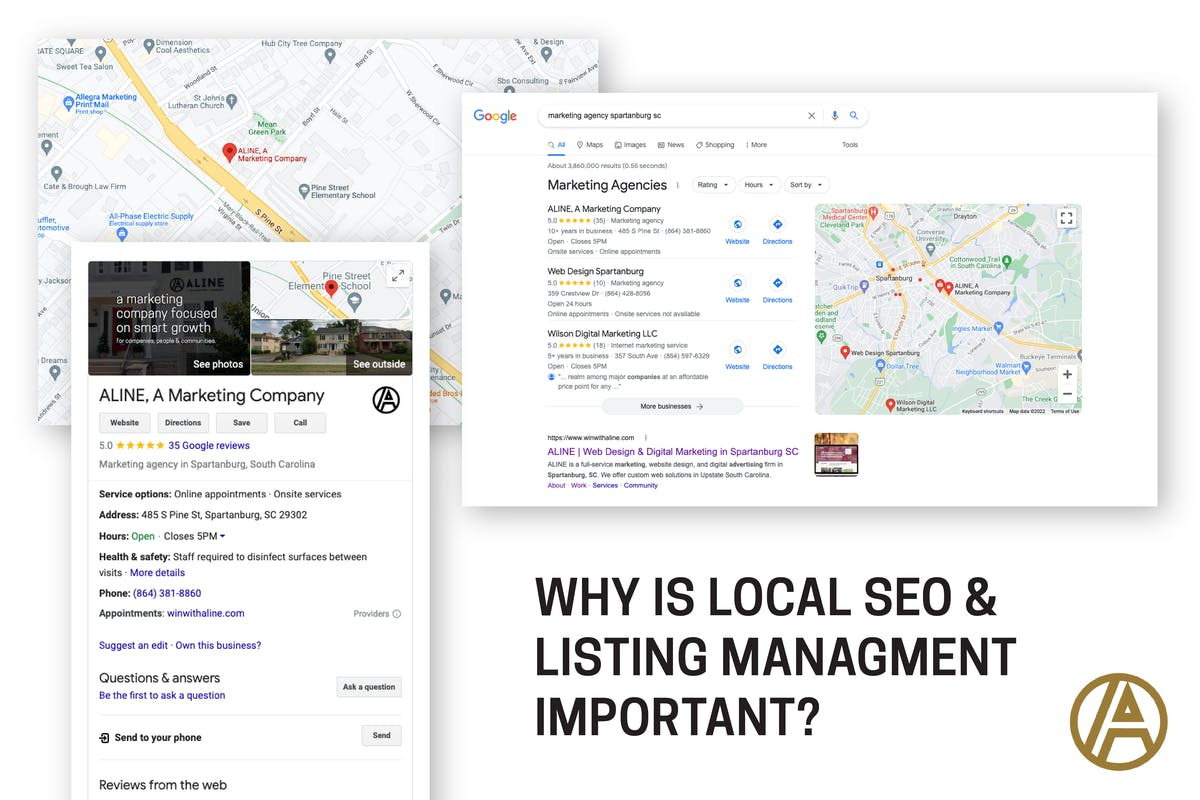
Local SEO & Listing Management Basics
SEO and Content Strategy | 7 read
What is Local SEO?
Local SEO is the process of improving online search visibility for businesses that serve their local communities. This includes brick-and-mortar businesses with local, physical locations or service-area businesses that serve customers throughout a specified geographic area. The goal is to optimize your website and online listings so more people in your local area will find you in organic search results, more specifically in the Local Pack / Map Pack.
Why is local SEO important?
If your business sells products or services to the community around you, then you want people to be able to find your location easily when they’re searching online. For example: If you own a local bakery and someone searches online for "cupcakes near me," you want to make sure your website shows at the top of the search results. This is what local SEO is all about: helping customers find your business online and pointing them toward your products and services.
What is listing management?
Listing management (aka citation management) is the process of maintaining consistent business location data across online directories and platforms. This means making sure your citations (any mention online of your local business information, primarily the business name, address, phone number and website address) are accurate and consistent across online platforms and directories.
Why is listing management important?
Local listing management is important for both you as a business and for your customers. Consistency across multiple NAP (name, address and phone number) citations:
- Helps people find reliable information about your business
- Confirms to Google that you are a legitimate business that should be shown in local search results
For example, what would you do if you’re looking for a coffee shop in the area and find one listing for Local Java with an address on East Main Street and another listing for an address on West Main Street? You might wonder if the coffee shop recently moved or just doesn’t have the correct address. Either way, you might just choose a different coffee shop instead. Making sure your business listings online are complete and accurate will help new customers find you without any headaches.
The quantity of local citations may not matter as much as it used to, but it is essential to maintain accurate listings on the most important directories and search engines:
- Yelp
- Bing
- Apple Maps
These are the priority sites because they are the most authoritative directories, receive the most traffic and/or have the greatest influence on search rankings. They also provide additional spaces for you to engage with customers online.
Local city directories and industry-specific directories still have value as well (ex. Chamber of Commerce business directories, avvo.com for lawyers, etc.). These can add to your business’ local relevance for searches and increase online visibility.
How are local SEO and listing management related?
Local SEO and listing management go hand in hand. There is a lot of overlap between them, and you can’t really have one without the other.
The basics of all successful local SEO strategies include ongoing maintenance of your:
- Google Business Profile (GBP)
- Local listing management (NAP citations)
- Website content
In other words, you can’t optimize your local SEO without keeping up with your listing management!
Additionally, recent research supports that listing management is still important for local visibility and consumer engagement. This means, in addition to helping your business establish trust and create authority for potential customers, having multiple, accurate local citations can also help improve your local search rankings (local SEO).
How does listing management impact search rankings?
Even though Google does not make their algorithm public, we know that the consistency of citation data and local listing engagement (clicks to call, online bookings, etc.) are both still considered to be valuable ranking factors in local search results. Ranking factors are the components that impact where your website or business listing ranks in search results. So, making sure your business listings online are complete and accurate can potentially help your business appear higher in local search results.
The Local Search Ranking Factors annual report surveys the top experts in local search to determine which factors are driving rankings and conversions in local SEO. The 2021 survey identified Google Business Profile (formerly Google My Business) as the most influential ranking factor for Local Pack and Local Finder results.
Other takeaways from the survey include:
- Customer reviews continue to grow in importance.
- The importance of Google Business Profile signals (data coming from your Google profile) is significantly increasing.
All of this points to the conclusion that claiming and optimizing your Google Business Profile is the single most important action you can take to improve your local search rankings.
What types of businesses benefit from local listing management?
Any small-to-medium-sized business that operates within and serves a specific community/region qualifies for local listing management. They can be:
- Brick-and-mortar businesses with physical locations
- Service-area businesses that serve customers throughout a specified geographic area
A good guideline for determining whether a company would need/benefit from local listing management is whether or not they qualify for a Google Business Profile. Claiming your Google profile is the first and most important step for listing management, so if a business doesn’t qualify, then they most likely don't need to worry about local citations.
In general, local listing management is not relevant to ecommerce businesses or large businesses or corporations that operate on a national level and/or don’t interact face-to-face with customers. A national company with local offices that serve their local community may qualify for local listing management for the individual locations.
A business with multiple locations can claim Google Business Profiles for each of their locations. For example, if a local jewelry store opens a second location on the other side of town, they would want to claim a Google Business Profile for both storefronts. If businesses do not serve customers at each of their locations and/or do not want the location to be found through online search, then they do not necessarily need to claim Google listings for all locations.
How to get started
If you’re just getting started with local SEO or listing management for your business, it can all be a bit overwhelming. There are a lot of moving parts to consider, and the online search landscape is constantly evolving. Just start with the basics and take it one listing at a time. If you need some help getting started, don’t hesitate to reach out! We’d love to help.
